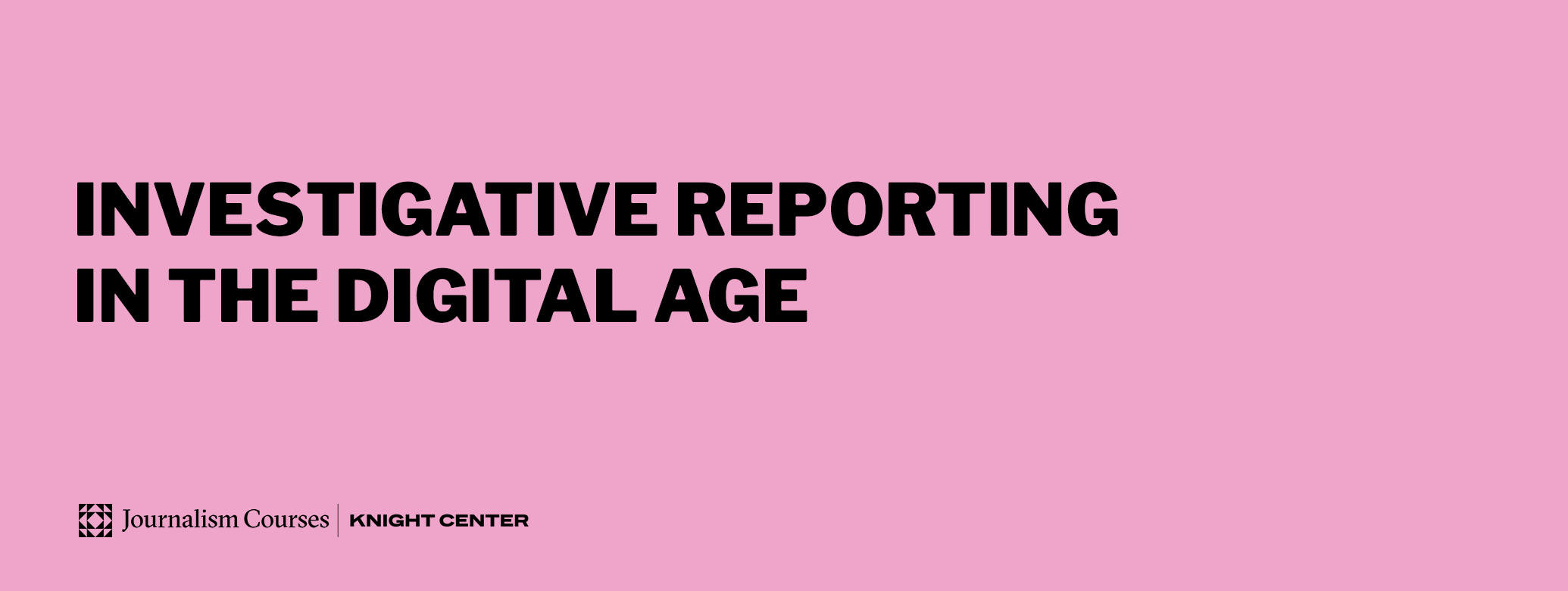Investigative reporting in the digital age
Programação
-

This self-directed course page features course content from the Knight Center for Journalism in the Americas' massive open online course (MOOC) titled "Investigative reporting in the digital age." The four-week course took place from February 3 to March 1, 2020. We are now making the content free and available to students who took the course and anyone else who's interested in investigative reporting and data journalism basics, including experienced investigators who seek to deepen their skills on complex investigations, collaborations and data journalism.
The course was taught by a great team of instructors: Lise Olsen, Alejandra Xanic, Lee Zurik, Denise Malan.
-
Welcome to the introduction module of our course!
This module provides a brief introduction to the course and to the outline of topics we’ll cover. Please review the video below to learn more about the course.
After watching this video, please explore the rest of the introductory materials, including the syllabus and recommended readings.
Don't forget to update your profile, and feel free to participate in the Student Lounge -- a special forum where you can interact with others who are taking the course.
Áreas de texto e mídia: 6 Páginas: 10 Fórum: 1 -
Module 1: Investigative Reporting - from your first idea
to highly complex probes
Instructor: Lise Olsen, Investigative reporter & editor, The Texas Observer
In this module you will learn:
- How and where can you start investigating. Lies, contradictions and other investigative opportunities
- Great sources and best places to start digging
- Case studies: how to organize complex investigations of individuals, from a serial killer to a corrupt congressman.
Áreas de texto e mídia: 7 Páginas: 7 URLs: 6 Fóruns: 2 Questionário: 1 -
Module 2: Transforming an idea into an investigative plan of action — solo or as part of a collaboration
Instructor: Alejandra Xanic, Pulitzer Prize-winning reporter and co-founder of Quinto Elemento Lab in Mexico City
In this module you will learn:- What are the steps in an investigation (and how can you survive it all?)
- How to turn a rough idea into an investigative plan
- Case studies: how independent reporters investigated the case of Mexico’s 2,000 hidden mass graves; inside the binational investigation of how U.S. giant Wal-mart violated Mexican laws.
Áreas de texto e mídia: 7 Páginas: 3 URLs: 12 Fóruns: 2 Questionário: 1 -
Module 3: Investigating on video — from mastering the confrontational interview to tapping your audience for help
Instructor: Lee Zurik, Emmy-award winning broadcast journalist at Fox TV in New Orleans
In this module you will learn:- Do’s and don’ts for conducting confrontational interviews
- New opportunities for using social media and crowdsourcing to investigate corruption, to obtain information and investigate quickly (even in a mass disaster situation)
Áreas de texto e mídia: 5 Páginas: 2 URLs: 6 Fóruns: 2 Questionário: 1 -
Module 4
DestaqueModule 4: The latest data journalism and dataviz tools to deepen your investigative work
Instructor: Denise Malan, senior training director for Investigative Reporters & Editors and data journalist
In this module you will learn:
- The importance of data in investigations and how to find data to deepen your reporting
- New options for securely sharing information with sources and collaboration partners
- Software and skills you need for your data journalism toolkit, including free data visualization tools to make your investigation more interactive (and generate more tips from readers)
Áreas de texto e mídia: 11 Páginas: 6 URLs: 21 Fóruns: 2 Questionário: 1-
Ver Fazer postagens no fórum: 1
-
Ver Fazer postagens no fórum: 1
-
Receber uma nota Receber uma nota de aprovação